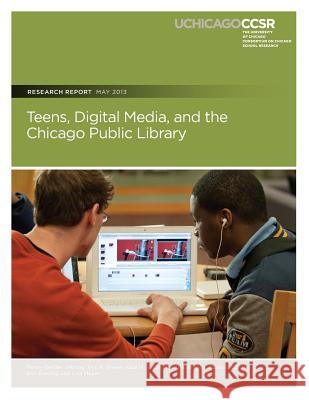Teens, Digital Media, and the Chicago Public Library » książka
Teens, Digital Media, and the Chicago Public Library
ISBN-13: 9780985681968 / Angielski / Miękka / 2013 / 74 str.
As new initiatives to exploit technology and digital media for learning sweep the country, a learning center for teens at the Harold Washington Library in downtown Chicago demonstrates both the challenges and opportunities that these efforts present, a new report from the University of Chicago Consortium on Chicago School Research finds. YOUmedia attracts between 350 and 500 teens weekly, the report finds. The largest single demographic group attending YOUmedia is African American males, who historically have been underserved by after-school programs. With the guidance of adults and collaboration with peers, participants discover and pursue their interests through activities such as blogging, writing and sharing poetry, playing and reviewing electronic games, producing music and videos, and participating in book clubs. Key findings from the report include: -YOUmedia is cultivating a budding sense of community among teens who participate. This sense of community, along with peer relationships, serves as a potent force for driving teens to engage in digital media in new ways. The vast majority of teens say that at YOUmedia it is "cool to be excited about your interests" and that they have met peers and mentors that share their interests. -A majority of YOUmedia participants report that they have improved their digital media skills due to YOUmedia. -The majority of teens also report that YOUmedia has helped them with their school work and better understand opportunities available to them after high school. -Staff members at YOUmedia have at times struggled to balance the imperative to let teens choose their own activities in the space with the desire to engage students in more structured learning activities. -Participation at YOUmedia differs substantially from teen to teen. While about 22 percent of teens regularly create original work, 28 percent use the computers to do their homework. A little over 30 percent use a variety of media, including video games, keyboards, and podcasts; and 18 percent primarily socialize and attend open mic sessions performed by other teens."











